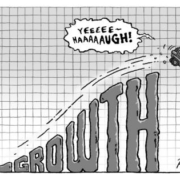Beyond the Ideological Echo Chamber: A Call for Intellectual Adaptability in Times of Transformation
by James Magnus-Johnston
From left-wing utopianism to right-wing denialism, ideological echo chambers across the world are eroding the capacity for original, reasoned, and systemic thinking. The United States’ drawn-out electoral process has once again brought out the worst in political tribalism. However, it has also provided an unexpected opportunity: a laboratory for intellectual rebellion and the formation of new, potentially enduring coalitions. Rather than fuel the fevered shouting matches across alternate-reality filter bubbles, can ecological economics play a role in bridging fractured worldviews?
Political tribalism is not merely an American phenomenon, but a primal psychological defense mechanism. Human beings fearfully hunker down in times of change. Precarity and revolution breed groupthink, leading to the collectivization of identity as a threat-mitigation strategy. Democracy suffers as a result. Today, as many bear existential concerns about the biosphere, pandemics, escalating debt crises, mass migration, AI, and war, society is retreating into anxious collectivist hovels. Fundamentally, though, we’re fighting our inner nature, not one another.

The ideological filter bubble influences what we understand about one another and the world around us (image generated by You.com).
The present wave of global fear and conflict has arisen partly because of sputtering growth, energy constraints, and associated demographic change. Limits to growth, in other words. Industrialized countries can no longer solve their issues with easy new salvos of mass production or resource extraction, especially as populations are beginning to shrink. This has led many of us to contract into scarcity mode, becoming more competitive and nativist in the process. Lately, the scramble for easy growth has resulted in hubristic agendas. These include inflationary money printing, housing inflation, war, and sideways investments.
Meanwhile, social media and partisan mass media appear to have created hermetically sealed environments. They have little to do with information exchange and everything to do with fearful blame-broadcasting, scapegoating, and priming us to accept a predetermined order. In today’s environment, it feels like a minor miracle that humans ever transcended their base instincts to engage in something resembling rational discourse.
Monochromatic Thinking in Ecological Economics
At the risk of stating the obvious, and poking a bear in the process, ecological discourse features its own anxious collectivism. Post-growth inquiry emerged from impactful critical insights about the limitations of neoclassical economic thinking. My hope is that it will someday outgrow this critical mode as its primary means of knowledge-making. However, the analytical lens of post-growth inquiry seems to have narrowed through a prism of a progressive political framework. The result is poor thinking, which fuels precisely the kind of anti-intellectualism the academy would otherwise be poised to address.
The gravitational pull of ecological economics toward off-the-shelf criticism and leftist political ideology simultaneously empowers and constrains its long-term potential. The potential constraint lurks in the left’s more fearful pitfalls and landing points. These include suppression of dissent, increasing central authority and coercion in the name of “justice,” and the stifling of original, creative ideas. Philosopher Alex DeToqueville believed that the totalitarian impulse (“despotism”) would manifest in contemporary democracies through a thick, stifling bureaucracy. He described it as:
Alexis DeTocqueville: French diplomat, political scientist, and historian (painting by Théodore Chassériau, Wikimedia Commons).
“…a network of small complicated rules, minute and uniform, through which the most original minds and the most energetic characters cannot penetrate, to rise above the crowd. The will of man is not shattered, but softened, bent, and guided; men are seldom forced by it to act, but they are constantly restrained from acting. Such a power does not destroy, but it prevents existence.”
Prescient, perhaps, depending on one’s experience of the world at present. Technologically-mediated access to just about everything facilitates a dubious paternalistic safety apparatus and an endless web of demoralizing restraint. This web of restraint can also be applied to energy and resource conservation, if we’re not careful. It can build a culture of begrudging, short-term compliance and simmering opposition rather than an enduring turn toward meaningful reform.
Even more dangerously, however, recursive leftist logic can sow the seeds of its own demise with predictability, uniformity, and ungrounded, even fanciful moralizing. In other words, it gets old. It’s a sure-fire way to cause an audience to grow tired and tune out. At its worst, the resulting ideology is anti-natalist, potentially nihilistic, and even self-destructive, which produces a paucity of hope. At its best, the critical discourse can foster creative and reasoned thinking that transcends divides and continually incorporates new information. Going forward, how can ecological economists leverage the best of critical discourse while avoiding soul-sucking ideologies?
In the spirit of biomimicry, I propose that ideological diversity can serve as an antidote to the extremes of conspiratorial, softly totalitarian, or fanciful thinking. It can help us reimagine economic systems with just enough daring, and without the trap of predictably self-destructive, anxious narratives.
A Respected Lineage of Critical Insight
I don’t mean to completely tar the critical impulse, so let’s unpack this criticism of critique. The pull toward the left in ecological economics is neither accidental nor simplistically ideological. Rather, it stems from a complex intellectual genealogy. The field has grown to incorporate critical thought beyond a critique of market fundamentalism. It includes Marxist economic analysis, feminist economic theory, and postcolonial environmental studies.
Perhaps this orientation will, in time, be seen as a phase of intellectual development preceding what many regard to be the fourth industrial revolution. It tends to draw folks who exhibit higher tolerance for complexity, greater empathy for systemic vulnerabilities, and a willingness to interrogate existing power structures. Yet by predominantly recruiting from academic and activist circles that already share a relatively homogeneous worldview, ecological economics risks developing blind spots as significant as those it critiques. The resulting danger is, somewhat ironically, that ecological economics will merge with a set of preexisting filter bubbles. We can’t address challenges stemming from mass media with simply another form of it.
Truly transformative thinking must transcend traditional political binaries. The field ought to be less about ideological purity—a self-perpetuated, communitarian anxiety response—and more about analytical frameworks that navigate the relationships among economic activity, social systems, and energetic constraints. This approach often resonates more strongly with left-leaning perspectives. However, there is a rich history of conservative conservationism, if you will. This type of conservative thought is often driven away from impractical, hostile intellectual forums. Yet, as a professor, I’ve observed that the next generation of dissenting “critical thinkers” is likely to come from the rising lineage of conservative conservationism.
Bridging Ideological Divides: Making Room for Conservative Conservationism
Conservative environmental perspectives reveal a rich and nuanced ecological ethos that extends far beyond simplistic political caricature. Many of these perspectives emerge from ancient philosophical traditions that emphasize stewardship, preservation, sacredness, and intergenerational responsibility. At their core, conservative ecological approaches connect environmental management to fundamental values of heritage, appropriately scaled technological innovation, and spiritual reverence for natural systems.
The principle of small government aligns with ecological thinking. Decentralized governance might more effectively manage resources through community-based, context-specific strategies rather than top-down, energy-intensive bureaucratic interventions. The principle of subsidiarity states that decision-making ought to occur at the most local, intimate level of social organization. This approach not only enhances resource use but also generates a rich ecosystem of intellectual diversity among isolated communities, allowing multiple perspectives and cultural approaches across the landscape.
This framework views environmental protection not as a progressive political project, but as a fundamental expression of traditional values. Land management becomes an act of cultural conservation, appropriate technological use represents economic wisdom, and environmental stewardship reflects a profound spiritual commitment to the natural order. These lenses are critical for whole-planet flourishing.
A collaborative “middle-way” approach to ecological economics and its related fields represents a sophisticated intellectual balancing act, deliberately holding multiple perspectives in productive tension rather than seeking ideological resolution. The latter is a natural perfectionistic impulse, but one that needs to be held in check.
A radically centrist ecological thinker can be a systemic mediator, understanding that meaningful environmental progress emerges from carefully negotiated compromises that respect diverse ways of knowing. Such a thinker might simultaneously value market-driven and business-oriented technological innovations, community-based ecological management, and structured regulatory frameworks. Though often seen as contradictory, these strategies can be complementary tools in a sophisticated framework.

We are undergoing a technological revolution in the midst of environmental crises; a situation necessitating intellectual flexibility (image generated by Gemini).
By maintaining intellectual flexibility and a commitment to empirical observation over ideological dogma, we can re-create an intellectual culture that prioritizes practical outcomes over theoretical consistency. This culture requires the development of adaptive strategies that evolve with changing environmental and social conditions. Changes that require such adaptive strategies include demographic decline, new forms of energy, “humachination,” and the very real possibility that some doom-filled predictions are so far off the mark as to be laughable. The task is a form of dynamic pragmatism. It must be always provisional, constantly evolving, and fundamentally committed to finding workable solutions in a world of irreducible and accelerating complexity.
Moral Foundations and the Potential for Collaboration
On the surface, the economic divide between left- and right-wing constituencies centers around the market. Simplistically, those on the political right tend to adhere to market fundamentalism, while left-wing factions tend to grasp at radical Marxism. But this ideological balkanization is not simply a philosophical disagreement. The reality is that we have a mixed economy where neither extreme will function without peril. The ideological divide is a complex psychological phenomenon where political identity increasingly serves as a primary mechanism of self-definition and belonging as other markers of group identity—such as nationhood, ethnicity, and religion—diminish.
Jonathan Haidt’s moral foundations theory offers a helpful lens for comprehending these divisions. Rather than viewing political differences as a battle between good and evil, Haidt reveals that conservatives and progressives draw from a shared moral palette, albeit with different emphases or “tastebuds.” Progressives tend to prioritize care and fairness, while conservatives give more weight to loyalty, authority, and sanctity.
This insight is a useful tool for bridge-building. Instead of dismissing conservative perspectives outright, ecological economics can develop communication strategies that resonate with diverse moralities. A broadly inclusive approach to environmental stewardship, for instance, might emphasize the preservation of heritage, respect for traditional land management, and intergenerational responsibility. To succeed at this approach will require a radical form of intellectual empathy. We must build the capacity to understand that different political perspectives are not simply wrong. They are expressing legitimate moral concerns through different cultural and psychological lenses.
A Call for Intellectual Courage
We are navigating a profound period of technological and social transition, characterized by unprecedented complexity and existential uncertainty. The Big Tech revolution represents more than a series of innovations; it is a fundamental restructuring of human experience. This moment of flux triggers a physiological response: a contraction of possibility, where uncertainty and fear-cum-bureaucracy can stifle experimentation.
To protect themselves from profound change, social groups reduce their loci of control. This psychological retrenchment has an overlooked cost: It systematically diminishes our capacity for innovation, subsidiarity, and adaptive thinking. By seeking safety through centralization and control, we inadvertently suppress the very mechanisms of resilience and creativity that could help us navigate complex transitions.
My call to action is both simple and revolutionary: embrace complexity and cultivate genuine dialogue. Develop the intellectual humility to acknowledge that our survival depends on our ability to adapt, collaborate, and think beyond tribal boundaries amid profound, transformational change.
 James Magnus-Johnston is a professor and department chair at Canadian Mennonite University.
James Magnus-Johnston is a professor and department chair at Canadian Mennonite University.








I could not agree more. Recognizing that the world does not conform to a binary view seems obvious but we struggle to accept that reality as individuals and to learn from it to guide our collective action. How do we get over that hurdle in time to avoid a catastrophic biological planetary reset?
Unfortunately, in reality, localization can make it easier for corruption to occur. Bribing a city council into approving a luxury housing project is easier than a state or federal govt.
And something for the left leaning folks to think about — stifling levels of bureaucracy and poorly performing public services pave the way for authoritarianism.
As a life-long lefty, I recognize the dank environs where the flow of life is impeded. On all sides!
We no longer have the luxury of our prim squabbles and duels, clearly we must all collaborate with everything we’ve got.
If previously each ‘side’ felt it could give no quarter to the ‘other’, for fear of being weakened or abused, now we are truly all in it together. Now we are building a sense of wholeness which must include every utopian vision and every practical detail.
What might break the impasse is the hard work of making clear to all the dangers and challenges, as evidence piles up until none can ignore it, and we’re getting closer and closer to this, especially as recent flips to the right expose their lack of magic bullets and magic wands.
Then we need only do the even harder work of agreeing to and acting on common strategies and tactics to save ourselves, and to live.
All good advice. With regard to turning down the temperature a bit, and cultivating more constructive interactions, over many years I’ve found one approach worth recommending:
If one is talking with someone in opposition, try to summarize their position and ask them if you’ve got it right. E.g, “Let me just make sure I’ve got this right, what you’re saying is that XYZ is really the problem here. Is that about right?” Even when someone is still heated up, if they say “Yes, dammit, and furthermore you people don’t blah blah blah”, the good thing is you’ve had them agree with something – your summary of their words.
That doesn’t sound like much, but I’ve found that this often helps shift the emotional dynamic from mindless conflict to a little more slow paced discussion. Everyone’s blood pressure goes down a bit, and (sometimes) some give and take can follow.
James, you author an interesting article worth serious consideration. My question is: was there a specific incident or intellectual exchange which catalyzed this piece? i’m aware of the obvious dichotomy of left and right perspectives on any issue, including political economy and the environment. But it does seem awfully obvious to me that capitalism‘s reliance upon endless growth and markets to regulate individual behaviors is the root cause of the existential dilemmas we face today. Therefore, isn’t it rather obvious that a collectivist response, such as some kind of Eco libertarian/socialist, political and economic organization is warranted, if for no other reason than to sustain human life on this planet?
Hi Michael,
I concur with you about the nature of the capitalist market and it’s apparent ideology “neoliberalism” with respect to those “existentialist dilemmas”, ecological damage, climate change and social dysfunctionality. But, the question for me is not WHAT linguistic labels we use to refer to possible solutions. I think this is one of the core points this article makes; however, it too falls into those linguistic labeling traps. Words are our tools for communicating effectively about the world, including ourselves leading to mutual understanding. I agree with Cole’s advice about entering and sustaining engagement. Listen very carefully and use language to clarify the other’s views to aid understanding and not winning points for your views.
For me, it was the tenor of the intellectual bubble over these last few years. There were many conversations featuring assumptions about morality (ie. “right” and “wrong”) without much consideration of the pitfalls/blowback associated with collectivist conformity. To the proposition of embracing a particular political ideology, I would rather get specific about a certain context and consider which actions are warranted and sustainable. For instance, can the debt-based money system be modified to improve material equality and reduce the consolidation of power? That’s a hell of a good starting point.
James, a thought provoking essay.. Your point that we identify as left or right and place greater weight on that element of our identities in a blurred world where many differences are accepted. Where difference is accepted maybe we identify along the lines of unaccepted differences. You’re right, identities need to be accepted and not messed with otherwise dialogue will quickly break down.
These ideas aside its my expectation that intellectually agreeing a way forward will not be the path taken. Too slow. Tech can potentially enable behaviour change with viral speed. Look at Amazon,YouTube tik tok etc. Dominating our lives within a decade. Can cooperatively owned business virally grow, competing with one another to deliver a sustainable world. Can they utilise social media to enable cooperating consumers to build personal reputations displayed online to their peers, demonstrating their record of responsibility and social fitness.?
Can surplus be directed to deliver on sustainability and peace building initiatives.?
Such a scenario is both leftfield in its caring trajectory while appealing to the right identity. The market dominated by coops and supported by individuals displaying and taking responsibility for their behaviour, the free market which can compete to supply our demand for a sustainable existence.
Yes, it does seem that we identify according to unaccepted/unacceptable differences. Having owned/run and served on the boards of cooperatively-owned socially responsible businesses (big and small), I have seen good things happen, but I have also see predatory self-aggrandizing behaviour usually associated with “capitalism.” This is an integral part of human nature — which makes me think that the future will be forged in unexpected places, featuring contextual shades of grey, plenty of dissent and hard, transformative conversations.
Left-right dichotomy poses problems, but so does having a linear scale. The entire axis rests on the presumption of an industrial society. We are already seeing industrialism crumbling at the edges as we flatline around peak oil. We can’t foresee how fast or how far industry will implode any more than we can foresee the way a jenga tower will topple, but clearly the industrial-consumerist complex is going to take a hit.
Central planning fails every time, whether it’s by a political tyrant or a cabal of billionnaire corporatists. The notion of an economy of scale is a falsehood stood up on the posts of its externalities. Regionalism and localism will have to prevail, to the detriment of all aspects of centralized complexity. The constellation of regulations necessary to rule a centralizing world view reminds me of the crazy complexity of equations that were once necessary to support an earth-centric view of the solar system.
However, bashing our centralized institutions with anti-government cabinet picks doesn’t foster regional or local governance. Its uncontrolled iconoclasm will end NASA and NOAA measurement and tracking of atmospheric and oceanic change, reinvigorate diseases we thought we conquered with vaccines, and allow toxins in our waterways that make the heavy metal pollution of Roman times through the Middle Ages look like childplay. We also have to beware the fine line between localism and provincialism. Furthermore, as long as technology allows people to wreak remote destruction, whether by atmospheric or water currents, some sort of cross-regional governance is needed.
How does a society walk a Goldilocks path of governance without falling down a slippery slope to the right or to the left? Maybe that’s the wrong question. We need a basin of attraction centered around the natural ecosystem, with plenty of resilience in which society can play.
I wonder if it does require industrialism, though undoubtedly it does in its present form. Whether we look at the distinction between Sparta and Athens, or other ancient forms of collectivism vs. more individualist frameworks, there seem to be other iterations. We’ll be likely to swing to -isms with easy answers during times of turmoil and transformation, but — you’re right — we do need north stars to point to!
This was a thoughtful piece. I do agree with the sentiment, and respecting the beliefs of others is important – but only up to a point, and only if grounded in reality. Some ideas are truly destructive or nonsensical and should be stated as such.
A heartfelt thank you for your amazing share! Your unique perspectives and detailed explanations have enlightened me a great deal. This is such a precious experience, and I’m really grateful for your generous contribution to all of us.
Ideological echo chambers—spanning from left-wing utopianism to right-wing denialism—are undermining humanity’s capacity for original, reasoned, and systemic thinking. Political tribalism, triggered by global crises such as biosphere threats, pandemics, debt crises, AI disruption, and wars, has become a primal psychological defense mechanism.